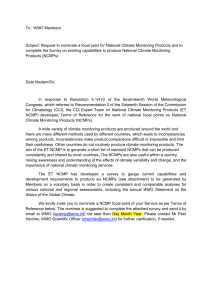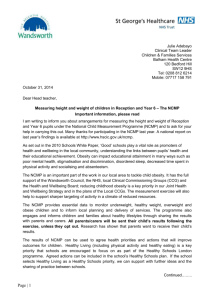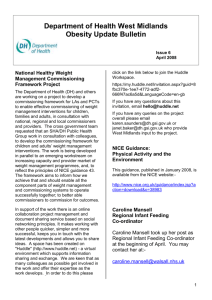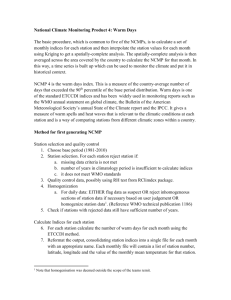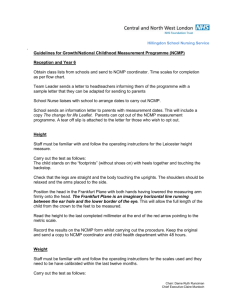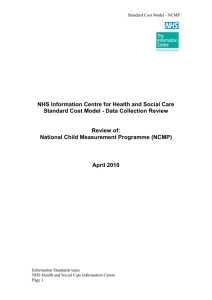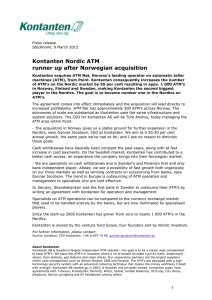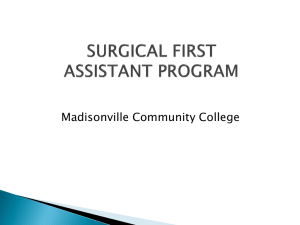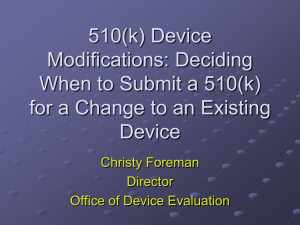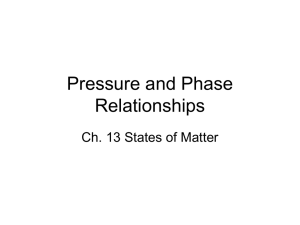North Coast Medical Products, Inc.
advertisement
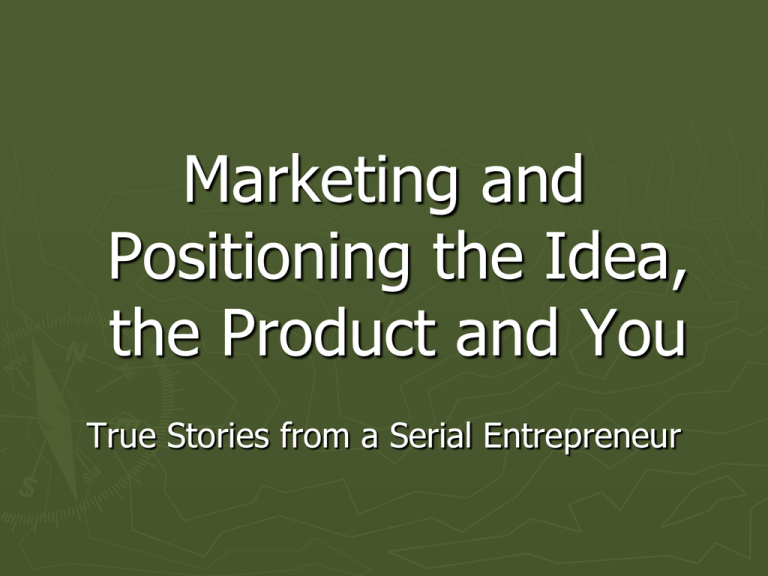
Marketing and Positioning the Idea, the Product and You True Stories from a Serial Entrepreneur North Coast Medical Products, Inc. My first big sale (selling “me”): Converting from being an employee to being an entrepreneur. The company: NCMP eventually sold and serviced the products of six different major medical manufacturers to hospitals in five different states: Ohio, Michigan, Indiana, Pennsylvania and West Virginia. The products: Operating room equipment, including surgical tables and accessories and supporting supplies, and also radiological equipment (fluoroscopic C-Arms). North Coast Medical Products ► What was good about the business model: - Start up costs were almost non-existent - Revenues came quickly (if you could sell) ► What was bad about the business model: - The hospital market is a VERY tough market to break into; but once you’re in, you’re “in.” - Lack of control over your destiny BE RELENTLESS! USE THE ADVANTAGES YOU HAVE TO GET THE JOB DONE. Why was NCMP was a success?: We allowed our salespeople to make a lot of money (and, therefore, they made US a lot of money!) We were one of the few companies who sold BOTH operating room and radiological equipment (dual specialization). We sold ourselves as not only having the best products, but as being “one less vendor” for the hospital to deal with. Last, I used my accounting background and played up the expertise associated with my being a CPA to “prove” to hospitals – on paper – how they could save money by buying the products I was selling. ALWAYS BE LOOKING FOR THE NEXT OPPORTUNITY. ► We ended up selling NCMP to a medical manufacturer who then shut it down. Why do you think we sold it? ► The most important result of NCMP: The product ideas for my NEXT company were a direct result of my experiences at NCMP. Because we sold to two different hospital departments when few others dared to do so WE SAW PRODUCT DESIGN PROBLEMS OTHERS DIDN’T. Some of the Product Design Problems We Saw at North Coast Medical Products The “C” didn’t fit around the surgical table. Existing products produced poor radiological images (white lines and white noise in the images) due to bad materials and bad design. The tables were difficult to adjust so the C-Arm had to be moved instead of adjusting the table: - Extra person in O.R. ($$) - Slower surgeries - Less surgeries ($$$) - Negative effects on patients 350 lb. weight limit of tables was too low. SO NOW THAT YOU SEE THE PROBLEM/OPPORTUNITY WHAT DO YOU DO WITH IT? ► At NCMP, we tried to get the medical manufacturers to improve their products. ► Opportunity Recognition: We could make a better product ourselves and be medical manufacturers – the folks in the industry who had control over their own destiny. ► My First Business Plan (why I did it): - I didn’t know how to manufacture – anything! - I didn’t know how much money I needed – or where the that money would come from. - Note: I did my first business plan to talk myself out of starting my second business – ATM. American Table Manufacturing, Inc. ► Q: ► How did we start it? A: We mortgaged our houses, found ourselves a good engineer and some industrial space and got going (a garage shop start-up and a lesson in humility). ► Q: How did we develop the products? ► A: From simple to increasingly complex tables (we developed two solid platforms that worked and then added to them). We subcontracted out or used off-the-shelf parts at first, but eventually built our own computers and fabricated certain other parts internally. ► Q: Where did we get our product ideas? A: From our customers and from our own observations. WHEN YOU WANT TO CONVINCE SOMEONE TO DO SOMETHING, YOU NEED TO THINK ABOUT WHAT WOULD MOTIVATE YOU TO DO IT. Who wants to buy the first surgical table ever manufactured by a brand new medical manufacturer? (How did I get hospitals to buy my product?) IF YOU’RE GOING TO GIVE SOMETHING BIG AWAY – BE SURE TO GET SOMETHING BIG BACK! The Cleveland Clinic The Mayo Clinic Massachusetts General Hospital (where the students from Harvard Medical School learn their trade) Johns Hopkins (Why did we target these particular hospitals?) WHEN YOU HAVE THE OPPORTUNITY TO DO “MORE THAN YOU HAVE TO DO” IN ORDER TO HELP YOUR FELLOW ENTREPRENEUR, DO IT. YOU NEVER KNOW WHEN YOU’RE GOING TO NEED A FAVOR IN RETURN. ► The Call (“I need help!”) ► The Decision (a begrudged, “ok”) ► Why it turned out to be one of the smartest things I’ve ever done…… SOMETIMES YOU HAVE TO DO THINGS YOU REALLY DON’T WANT TO DO. McCormick Place in Chicago: The RSNA trade show. Booth space was $10,000 per “space.” We needed at least 4 “spaces” to attend and debut our spectacular new ATM 6000 surgical table! I decided in order to attend, I’d need to be in SOMEONE ELSE’s booth space (an example of classic bootstrapping). Ideally a C-Arm company that didn’t have a surgical table line. (Who’d I have to call?) TRUTH REALLY CAN BE STRANGER THAN FICTION ESPIONAGE at a trade show (I had been warned)……what’s a “little guy” to do? GUARDING against further espionage and sabotage at a trade show……… Well….THAT didn’t work…Now what do I do? “Hello, now I need a favor………..” ATM’s successes within 2-1/2 years: We had developed a diverse line of surgical tables and surgical table accessories. We had solved design problems other manufacturers couldn’t - or wouldn’t – solve. We had product placed in major teaching institutions like Massachusetts General, etc. We had applied for our patents. Our products were UL-listed. -- So, what’s next? WHAT WAS NEXT “What do you mean it’s time to sell the company?” And by the way, HOW do you sell a company like ATM? (NCMP vs. ATM) Repercussions of being an FDA compliant company: - Compliance vs. approval. - Being subject to surprise audits and site visits. WHEN IT COMES TO MARKETING ANYTHING, AN OUNCE OF PREVENTION IS WORTH A POUND OF CURE Potentially the largest difficulty in marketing and selling ATM? My early research showed it was convincing our potential buyers we were FDA compliant. Luckily we had planned ahead (we had decided our exit strategy was to sell the company when we prepared the business plan) and, by the time we were ready to sell, we had already addressed the issue. How do you know you’ve satisfied the FDA? - Code of Federal Regulations - Look at what other companies are doing - FDA website………? The Answer FDA Auditor Training! HOW TO SELL YOUR SMALL COMPANY TO A BIG COMPANY - Investment bankers (fee negotiation) - Attorneys (experience counts!) - Develop the Management Presentation - Sales Approach: The concept of the Strategic Buy (selling your PRODUCT vs. your revenue/profit record). - The due diligence process………………. DUE DILIGENCE - Massive amount of paperwork! - Problem: How do you give your potential buyer (a competitor) enough information to want to BUY your company, but not enough information to destroy you if they don’t? (In my opinion, the answer is NOT a confidentiality agreement.) SOMETIMES THE BEST OPTION, THE ONLY OPTION, IS TO SIT DOWN, SHUT UP AND …..WAIT. ► So it’s September 10, 2001 and we’re in the very final stages of negotiating the sale of ATM to a much larger corporation…. ► …..Nothing can go wrong now, right? ► What I learned AFTER the sale ► Trust your gut and do everything in your power to protect your company’s reputation: The Story of “Big Jim.” ► Imperial Luxury Home Builders: How do you market yourself as a new luxury home builder?
